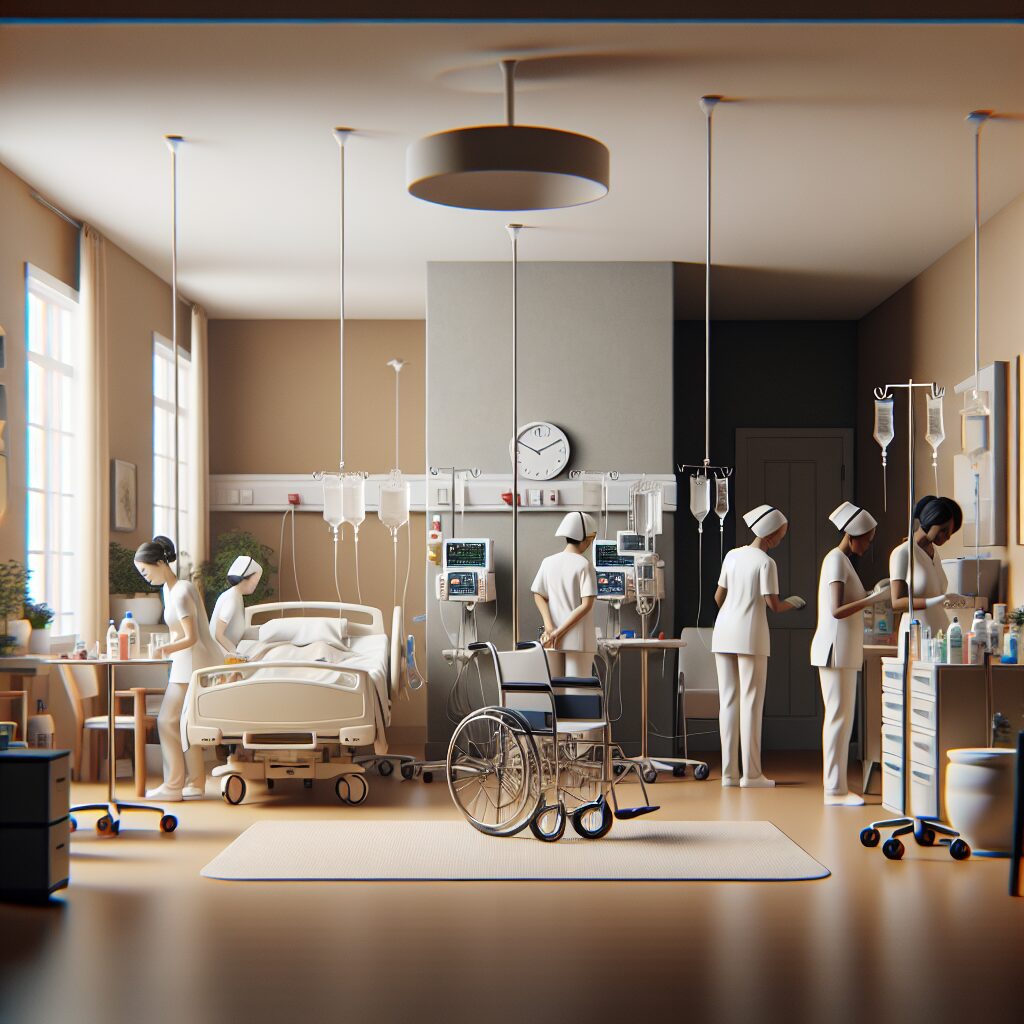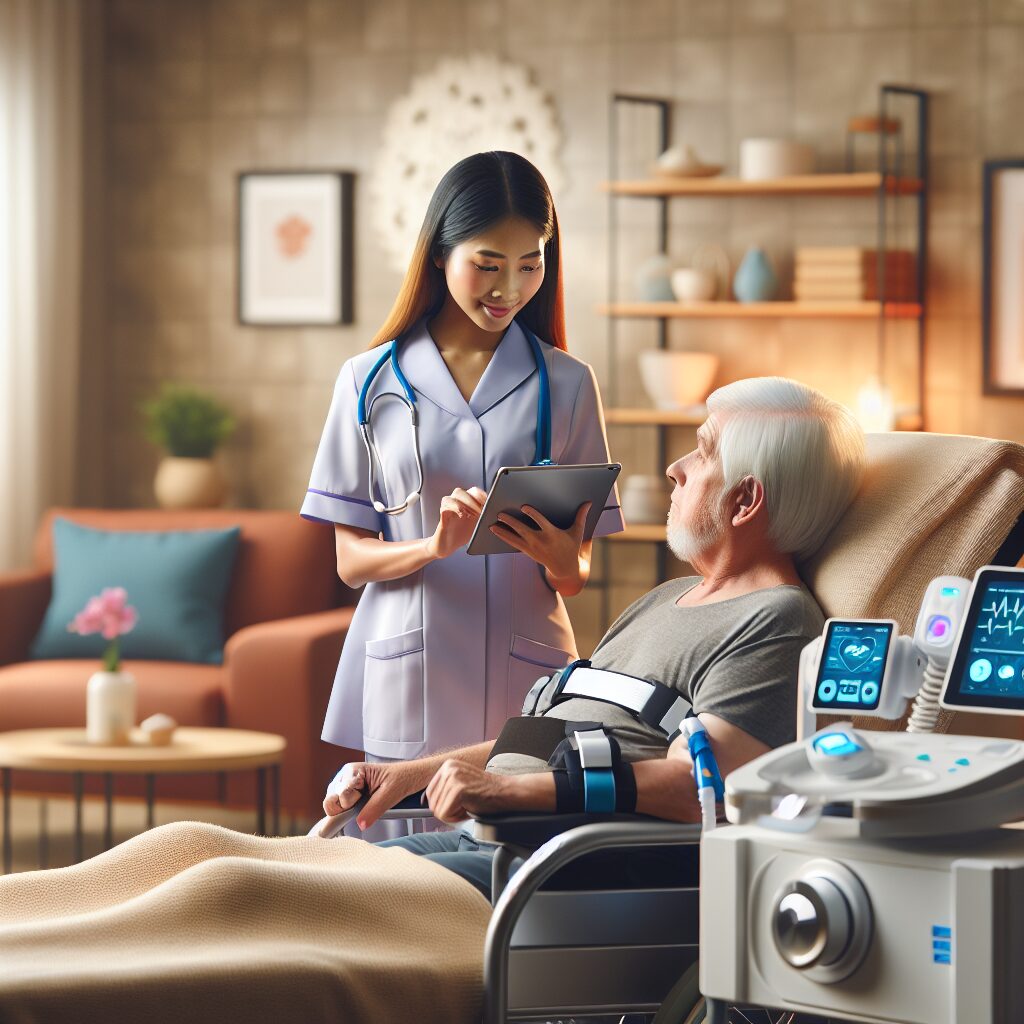
What Qualifications Do Home Health Care Providers Need
Home healthcare providers play pivotal roles in ensuring the well-being of their clients, particularly the elderly population. They must possess a myriad of skills to address the diverse needs presented by this demographic.
Geriatric care competencies are essential for home healthcare providers, requiring an understanding of long-term care worker qualifications and palliative and end-of-life care education.
Mental health awareness is also crucial, allowing providers to recognize signs of mental health issues and offer appropriate support.
Cultural competency is another key skill, enabling providers to respect and appreciate diverse cultures while fostering trust and effective communication with clients. Client assessment expertise is vital for accurate evaluation of a client’s physical health conditions as well as social and emotional factors affecting their overall well-being.
While not always mandatory, elderly care certifications can demonstrate a provider’s commitment to quality care and provide additional training opportunities. Home healthcare providers must be adaptable, empathetic, and dedicated professionals who prioritize the needs of their clients above all else.
Home Healthcare Provider Skills
. This proficiency extends beyond mere conversation; it encompasses understanding a patient’s unique needs and preferences, fostering trust and accurate care in a telehealth setting.
At the heart of comprehensive patient care lies a deep understanding of vital signs assessment, medication administration, wound care, and personal hygiene.
This expertise extends to nursing practices, involving knowledge of disease processes and treatment plans, collaboration with healthcare team members, and maintaining effective communication with patients and families.
Home healthcare providers often serve as caregivers, offering respite care and relieving family caregivers temporarily.
They also engage families in elderly care, fostering a collaborative approach for the patient’s overall well-being.
In today’s digital age, telehealth proficiency is essential, especially for long-distance elderly care management.
This requires mastery of remote monitoring tools and technologies to ensure effective care delivery despite the physical distance from patients.
HIPAA compliance remains a cornerstone in home healthcare, protecting sensitive patient information while delivering effective care. Geriatric nursing skills are indispensable, as they equip providers with the knowledge and ability to cater to the unique needs of elderly patients.

Can a Caregiver Adapt to Telehealth?
Caregivers struggle to adapt to telehealth services in the rapidly changing healthcare landscape. Pediatric home health providers and adult daycare specialists have already tailored their unique expertise to remote patient care, paving the way for others.
Assisted living professionals and those in nursing homes can find fertile ground for their skills in this digital terrain.
Meanwhile, rehabilitation therapy competencies – including occupational therapy, speech-language pathology, and physical therapy knowledge – thrive in a telehealth setting.
To seamlessly adapt, caregivers must gear up for the transformation.
Enhanced communication skills are paramount, involving proficiency with telehealth technology and demonstrating empathy and active listening during virtual sessions.
Caregivers should also focus on developing technical prowess: mastering platforms, equipment, troubleshooting common issues, and ensuring privacy and security throughout video calls.
Continuing education and professional development are key to staying abreast of telehealth’s dynamic landscape.
This might involve pursuing certifications, licensing, tracking regulations, and participating in workshops, webinars, and training sessions.
Telehealth offers numerous advantages to caregivers: expanded patient access, increased flexibility, and heightened collaboration among healthcare providers.
- Telehealth allows for expanded patient access.
- Increased flexibility is a benefit of telehealth services.
- Heightened collaboration among healthcare providers is facilitated by telehealth.
- Enhanced communication skills are essential for caregivers in a telehealth setting, including proficiency with technology and demonstrating empathy and active listening during virtual sessions.
- Developing technical prowess is crucial for caregivers, involving mastery of platforms, equipment, troubleshooting common issues, and ensuring privacy and security throughout video calls.
- Continuing education and professional development are key to staying abreast of telehealth’s dynamic landscape, including pursuing certifications, licensing, tracking regulations, and participating in workshops, webinars, and training sessions.
What Qualifications Are Required to Provide Empowering Care at Home?
To provide empowering care at home, caregivers should have relevant qualifications such as certified nursing assistant (CNA) or home health aide (HHA) training. These qualifications enable them to focus on promoting independence and improving the quality of life for empowering patients at home.
Elderly Care Certifications
Caring for the elderly can often feel like navigating uncharted territories, filled with both challenges and rewards. Regardless of one’s experience, gaining specialized knowledge is a vital step in this journey.
In the realm of nutrition, understanding the unique dietary requirements of senior citizens is paramount for maintaining their health.
This includes meal planning, special diets, and food safety measures.
As mobility begins to decline with age, learning safe transfer techniques becomes an essential skill for caregivers.
Mastering these methods helps in moving patients efficiently while preventing potential injuries.
Dealing with memory loss, such as that associated with Alzheimer’s or dementia, requires a blend of patience and knowledge.
Caregivers are offered strategies for effective communication, behavior management, and safety measures to ensure the well-being of those affected.
Wound care is another critical aspect of elderly care. Certification programs cover wound assessment, treatment, and prevention strategies to minimize complications in seniors who are susceptible to pressure ulcers and other wounds.
In respiratory care, administering oxygen therapy correctly can be a matter of life and death for seniors with respiratory issues.
Programs provide instruction on proper equipment use and monitor patient response to ensure optimal results.
When it comes to catheter care, knowledge is power. Certification programs educate caregivers on various catheter types, insertion techniques, and maintenance procedures to reduce the risk of infection in seniors dealing with incontinence or urinary problems.
Proper ostomy care is essential for seniors with intestinal or urinary diversions.
Certification programs cover ostomy basics, including hygiene practices, pouch changes, and troubleshooting common issues to maintain the health of those affected.
Managing incontinence requires a deep understanding, empathy, and proper care techniques to preserve dignity and promote comfort.
Caregivers learn how to handle different types of incontinence while providing top-notch care to their elderly charges.
Required for LongTerm Care Workers
In long-term care settings, the safety and wellbeing of patients are paramount. This necessitates a unique blend of skills, strategies, and certifications.
Identifying and addressing fall risks is a critical aspect of these skills, requiring a proactive approach to patient safety.
To prevent injuries, it’s essential to master safe patient handling techniques.
These strategies can significantly reduce the risk of strain or other musculoskeletal issues when caring for patients.
In the face of potential infections, understanding infection control procedures becomes indispensable.
This knowledge includes practicing good hand hygiene, using personal protective equipment, and implementing isolation techniques to halt the spread of diseases.
First Aid and CPR certification are invaluable tools for long-term care workers, equipping them to respond swiftly and effectively in emergency situations.
Proper training in medication administration is crucial.
This encompasses understanding drug interactions, dosage calculations, and the importance of accurate documentation.
Chronic illness management requires a deep understanding of disease processes and symptom management strategies to provide supportive care for patients living with these conditions.
Working with individuals with disabilities demands patience, compassion, and adaptability. Long-term care workers must be able to tailor their care plans to meet the unique needs of each patient.
Hospice care training can prepare long-term care workers for end-of-life situations, ensuring that the dying process is as comfortable and dignified as possible.
These essential skills, strategies, and certifications are vital for long-term care workers in delivering quality care to their patients and maintaining a safe working environment.
| Skill | Importance Level | Certification Required | Benefits for Patients and Workers |
|---|---|---|---|
| Fall Risk Identification and Management | Critical | No | Reduces patient injuries and musculoskeletal issues for caregivers |
| Safe Patient Handling Techniques | Critical | Yes (Certification) | Prevents strain and other injuries for caregivers while caring for patients |
| Infection Control Procedures | Critical | Yes (Certification) | Helps halt the spread of diseases among patients and caregivers |
| First Aid and CPR Certification | Essential | Yes (Certification) | Enables quick and effective response in emergency situations |
| Medication Administration Training | Crucial | Yes (Training) | Reduces medication errors, ensures accurate dosage and documentation |
| Chronic Illness Management Understanding | Vital | Yes (Training) | Supports patients living with these conditions, provides supportive care |
| Working with Individuals with Disabilities | Vital | Yes (Training) | Requires patience, compassion, and adaptability for tailored care plans |
| Hospice Care Training | Vital | Yes (Training) | Ensures a comfortable and dignified dying process for patients |
Palliative and end-of-life care Education
In the healthcare sector, mastering patient care competencies, including effective communication, symptom management, and emotional support skills, is pivotal for professionals seeking to deliver compassionate, expert care during critical periods.
Insurance coverage for home healthcare plays a significant role in this domain. Medicare and Medicaid guidelines dictate the services covered under their respective programs, while VA benefits for home health services offer additional resources to veterans and their families.
Dementia care training is an integral component, empowering providers with the skills necessary to navigate complex scenarios arising from this condition.
Mental Health First Aid courses offer valuable insights into mental health challenges often encountered in end-of-life situations.
Geriatric care providers must acquire specialized credentials to meet the high standards demanded by this sensitive field.
These credentials typically involve formal education, on-the-job training, and continued professional development opportunities.
Collaborative care is essential for comprehensive, coordinated care delivery.
Interdisciplinary collaboration among healthcare professionals ensures patients receive optimal treatment throughout their end-of-life journey.
Navigating the emotional landscape can be challenging for providers. Strategies to cope with burnout and compassion fatigue include self-care, peer support, and debriefing sessions after difficult cases.
Empowering patients and families is central to palliative and end-of-life care education.
Education equips them to make informed decisions about their care, fostering a patient-centered approach that honors individual preferences and values.
The Real Cost of Home Health Care Services: What You Should Know
Home Health Care Services: An Overview

